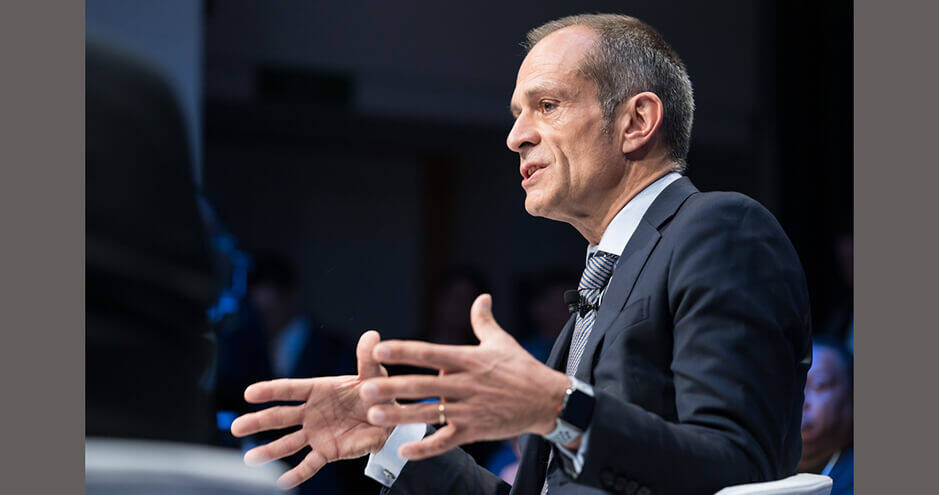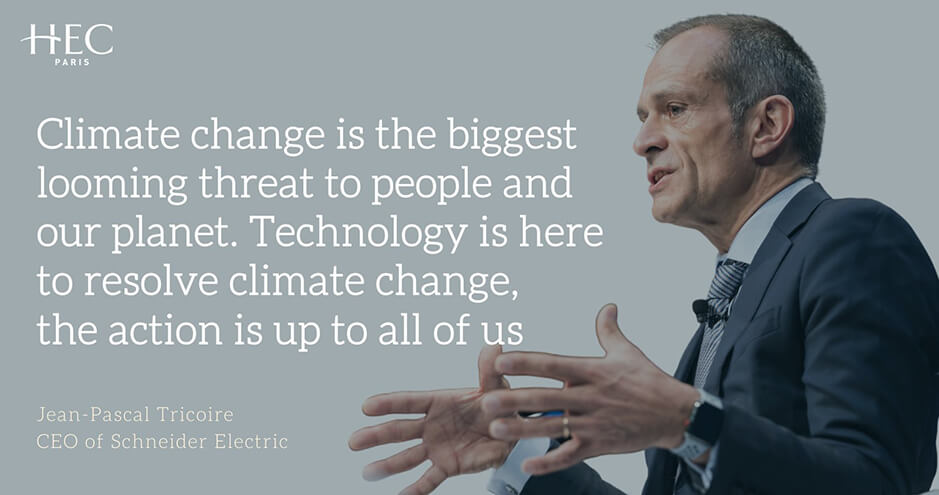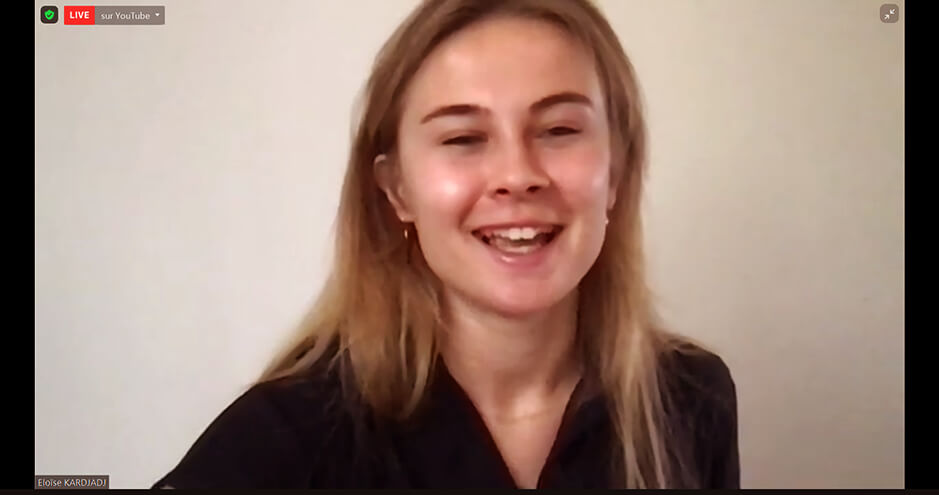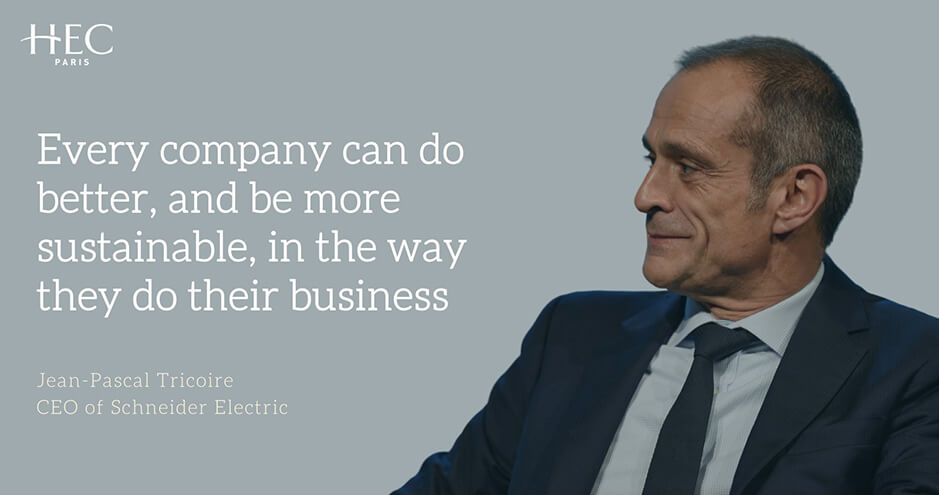Schneider Boss : Digitization and “Doing the Unexpected” are Keys to Future
Digitization and carbon reduction were at the heart of a landmark April 1 exchange between HEC students and Schneider Electric CEO Jean-Pascal Tricoire. Invited for the first time ever by Esp’R and HEC Débats, Tricoire was assertive and frank in answering probing questions from students who have made sustainability a priority for the future.

“You know, I am very jealous of you students. Being young today beats working as a CEO any day.” With these words, Jean-Pascal Tricoire closed the April 1 online exchange. It was characterized by candid, sometimes pointed, appraisals by the Schneider Electric (S.E.) Chairman and CEO, who has pioneered a new form of leadership in his 15 years-plus at the helm of the company and its 128,000 employees worldwide. Many might have cocked an eye, but Tricoire explained: “You are entering a world that is far more open and global than the one I faced 30-40 years ago. You are also living the biggest technological revolution humanity has ever known, one which is affecting society at all levels. This will solve the major challenges our generation is facing. Furthermore, you are more aware than ever of the need to preserve both nature and human relations.”
Such steadfast optimism has been the trademark of Tricoire’s years at the head of a multinational energy company. Over the years, he has repeatedly pioneered sustainable business and what Corporate Knights called a “decarbonizing megatrend”. These successes explain why Esp’R president, Louis Fidel (H23) insisted at the outset of the conference that Schneider Electric has a key role to play in the energy transition that industry must undertake: “Furthermore, your presence here is highly topical,” said the second-year student in the conference’s opening remarks. “The French National Assembly is currently debating the passage of the Climate & Resilience Law. Your actions must be amplified because of the urgency of making this energy transition possible.”
“Digitization is 50% of what we do”
The French company has a proven track record in sustainability. The company has been ranked the world’s most sustainable corporation by Corporate Knights Global 100 Index thanks to its move away from high-voltage electrical distribution to more energy efficient and renewable options. This is largely thanks to a digital transformation that Tricoire mapped out on April 1 from his Hong Kong base. “We’ve been championing sustainability by making each customer consume less and more intelligently. Our electrification is based on a zero-carbon policy and is more digital. Nowadays, digitization is 50% of what we do.”
Another key to Schneider Electric’s success has been Tricoire’s insistence on decentralizing – “something which is very un-French, I know” he said with a smile. “People should be empowered to organize according to local realities. We adapt geography by geography,” he added, in reference to the 100-plus countries on the five continents on which his company operates.
Prescient Anticipation of Crises?
By his own admission, the professional path taken by the 57-year-old has been a long one. When Tricoire was nominated as CEO in 2006, he surrounded himself with a team of young engineers from various backgrounds and nations, many dogged by energy shortages. “Their presence on the board were reality checks. We had to imagine something different, like leveraging new technology. Because we knew that access to energy was the passport to a decent life. At the time, we were the only ones speaking about renewables. But things have evolved: five years ago, you might have noticed, the COP 21 moved climate change policies away from politicians and NGOs and towards cities and companies.”
What no one could foresee, it seems, was the COVID-19 induced crisis. Or could they? Student Maëlle Buet quoted a May 2020 Le Point article, which describes Tricoire’s game plan for the future. These, writes the weekly, seems to have anticipated the pandemic onslaught. Tricoire denied this: “No, I didn’t have a crystal ball. We just put in place a mission to prepare the world of the future, a more resilient, decentralized way to operate. Nowadays, we see that the Internet of Things is keeping us alive. And governments in the 100 countries where we work are asking us to continue operations despite the shutdowns, because we are maintaining electricity in hospitals, driving cold-chain networks and water treatment systems, providing power for retired homes…”
And Digital Effluence?
The CEO did not shy away from the students’ tougher questions: “IoT is causing digital pollution. How is Schneider Electric dealing with it?” asked Eloïse Kardjadj. “I like figures,” shot back Tricoire. “Words fly, but figures remain. We must be honest: 80% of IoT derives from our leisure activities, Netflix, video streaming, the social networks, and the photos you stock on your Cloud. IoT consumed by business represents the remaining 20%. And, in fact, in this case, its usage actually saves energy: each time we have a Skype meeting, we are cutting down on the fossil fuel used to travel around the globe.”
Schneider Electric is one of only three CAC 40 companies going beyond the legal requirements in reducing their carbon imprint. Tricoire took the opportunity to make three solemn pledges: “We want to be carbon-neutral by 2025; have a zero-biodiversity loss by 2030; and espouse an internal ecosystem which is carbon-neutral by 2040.” The CEO said he could help other French companies in accelerating their own sustainability policies: “We are both the doctor and the pharmacist. That’s because we have a consulting branch with real solutions, to add to our 100 factories and 100 logistic centers. But I want to be clear,” Tricoire continued: “We believe in speed, not size. That’s because the contact with the customer is primordial. This allows for very small hierarchical layers and it empowers people on the field.”
Rare combination for Success
Finally, Jean-Pascal Tricoire invited the students in virtual attendance to join his drive for sustainability. “My advice to you is do the unexpected. Embrace differences. Accept missions you don’t at first understand. And try to comprehend the vision of others - because the world of the future is much more diverse than the world of today.”
Since the creation of the HEC Social Business Chair in 2008, Schneider Electric has seen its engagement grow towards a better and fairer access to energy, especially for the poorest segments of population. Inclusive economy initiatives have become pillars of their strategy, inspiring many observers to promote their policies as examples for other multinational companies to follow. After Tricoire’s one-hour conference, S&O Institute’s Academic Director and co-founder, Rodolphe Durand, commented: "At Schneider Electric, there is a strong leadership and a clear mission statement towards sustainability. These are embedded in the culture and engraved in incentive structures. The company’s capacity to embark and empower people will be the key success factor to achieve their eleven concrete sustainability goals by 2025.” For Jean-Pascal Tricoire, this goes through a rare combination of local, digital and out-of-box management.
Watch the conference replay


